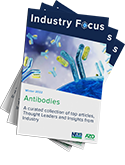What is the effect of low Anti-Müllerian hormone on semen quality?
A recent BMC Medicine study investigated the relationship between Vitamin D and serum Anti-Müllerian hormone (AMH) in infertile men. This study was based on secondary analysis of a randomized clinical trial, which assessed the effect of high-dose Vitamin D plus calcium and placebo on semen quality in Vitamin D deficient infertile men.

Importance of AMH
Antibodies eBook

AMH is a glycoprotein that belongs to the transforming growth factor β (TGF-β) family. AMH plays an important role in normal sexual differentiation in men. In the first trimester of male fetal development, this hormone assists in the regression of the Müllerian duct.
At puberty, the level of AMH in serum decreases rapidly, and in adults, this level reaches around 3–4% of the total concentration prevalent during infancy. Even though follicle-stimulating hormone (FSH) is a known stimulator of AMH, the increase in testosterone level during puberty enables Sertoli cell maturation, which indirectly reduces serum AMH.
In the general adult population, serum AMH is linked with testis size, but not with sperm concentration. Very few studies have evaluated the relationship between serum AMH and semen quality in infertile men.
In both humans and animals, Vitamin D plays an important role in male reproduction and sex steroidogenesis. Even though one study showed the Vitamin D response element in the promotor region of AMH, not much evidence assessing the link between Vitamin D and AMH in men has been documented.
About the study
The current study is a part of the Copenhagen Bone-Gonadal Study, which is a double-blinded, single-centered, randomized clinical trial conducted at the Copenhagen University Hospital, Denmark. The inclusion criteria of the current study were Vitamin D deficiency, i.e., serum Vitamin D level ≤ 50 nmol/L, and no serious comorbidities.
All participants were randomized 1:1 to active or placebo treatment for a period of 150 days. A total of 151 men were in the active group and they initially received oral 300,000 IU cholecalciferol, followed by daily supplementation with 1400 IU cholecalciferol and 500 mg calcium. The placebo group contained 156 participants and they received an oral bolus of oil and placebo tablets. Two semen samples from each participant were collected, before and after 150 days of the study period, for an andrological examination.
Findings
A low serum AMH was found to be a marker for poor gonadal function. This finding was based on impaired semen quality, along with lower serum inhibin B, testosterone/LH ratio, inhibin B/FSH ratio, and higher serum FSH in the cohort of infertile men.
A low serum AMH could be due to poor Sertoli cell function, which is supported by higher FSH, lower serum inhibin B, and decreased inhibin/FSH ratio in men having the lowest serum AMH with a threshold at 26 pmol/L. An impaired Sertoli cell function could be attributed to an inadequate number of germ cells.
A lower serum AMH manifests as threefold lower sperm quantity and smaller testis size in men. The number of germ cells predominantly determines the size of the testis. Hence, a low serum AMH could be an indicator of the function of seminiferous tubules and Sertoli-germ cell interaction. A low concentration of serum AMH along with impaired Sertoli cell function could lead to inadequate Leydig cell function. In the future, the difference in reproductive hormone levels between the two study groups could be further supported via testis histology.
The findings of the present study are consistent with a recent study that revealed serum AMH is positively correlated with serum FSH, sperm production, and serum inhibin B in normozoospermic men. Nevertheless, several studies have contradicted this result, which could be because some infertile men might have higher serum AMH due to the presence of more immature Sertoli cells that challenges the clinical applicability of serum AMH levels.
The combination of low levels of serum AMH and high levels of serum FSH was a better marker for semen quality than AMH alone. This combination indicates adverse prognostic signs in infertile men. Contradicting previous studies, the current study revealed that Vitamin D deficiency did not affect serum AMH levels. In addition, no change in serum AMH levels was observed over time in the Vitamin D-treated men. Vitamin D supplementation also did not affect serum AMH, even in men with Vitamin D deficiency.
Conclusions
The current study indicated that Vitamin D has no association with serum AMH in infertile men. A low serum AMH could be used as a marker for impaired Sertoli cell function and poor sperm production in men with infertility.
- Holt, R. et al. (2023) Low serum anti-Müllerian hormone is associated with semen quality in infertile men and not influenced by vitamin D supplementation. BMC Medicine. doi: https://doi.org/10.1186/s12916-023-02782-1 https://bmcmedicine.biomedcentral.com/articles/10.1186/s12916-023-02782-1
Posted in: Men's Health News | Medical Science News | Medical Research News
Tags: Bone, Calcium, Cell, Clinical Trial, Glycoprotein, Growth Factor, Histology, Hormone, Hospital, Infertility, Medicine, Placebo, Puberty, Reproduction, Semen, Sperm, Testosterone, Vitamin D, Vitamin D Deficiency

Written by
Dr. Priyom Bose
Priyom holds a Ph.D. in Plant Biology and Biotechnology from the University of Madras, India. She is an active researcher and an experienced science writer. Priyom has also co-authored several original research articles that have been published in reputed peer-reviewed journals. She is also an avid reader and an amateur photographer.
Source: Read Full Article
